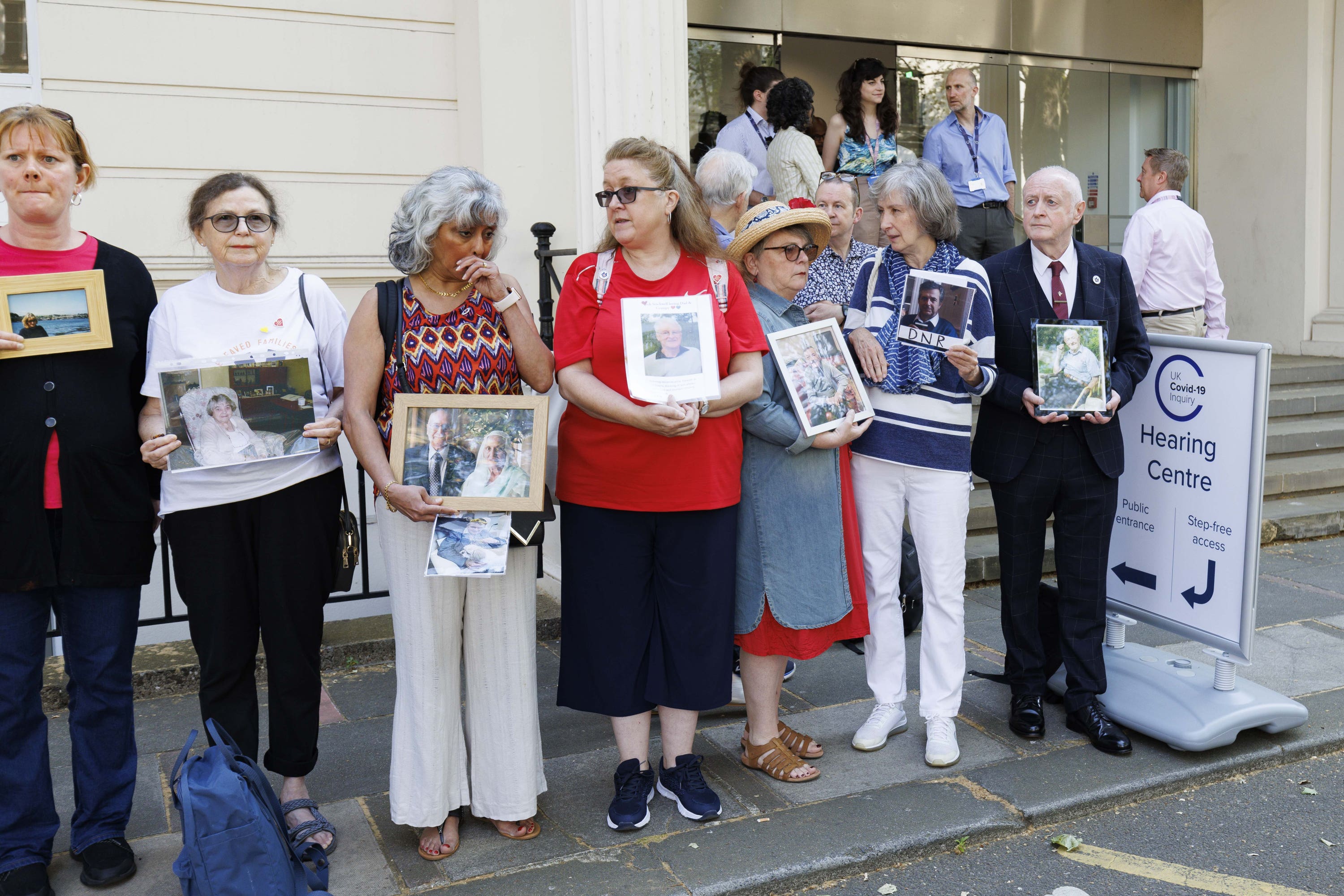Bereaved families hold pictures of loved ones in vigil outside Covid inquiry
Tuesday’s hearing will see a video featuring people sharing their experiences of loss but some families said they feel marginalised.

Your support helps us to tell the story
From reproductive rights to climate change to Big Tech, The Independent is on the ground when the story is developing. Whether it's investigating the financials of Elon Musk's pro-Trump PAC or producing our latest documentary, 'The A Word', which shines a light on the American women fighting for reproductive rights, we know how important it is to parse out the facts from the messaging.
At such a critical moment in US history, we need reporters on the ground. Your donation allows us to keep sending journalists to speak to both sides of the story.
The Independent is trusted by Americans across the entire political spectrum. And unlike many other quality news outlets, we choose not to lock Americans out of our reporting and analysis with paywalls. We believe quality journalism should be available to everyone, paid for by those who can afford it.
Your support makes all the difference.Bereaved families holding pictures of their loved ones lined up outside the UK Covid-19 Inquiry building as the major probe into the handling of the pandemic officially began its public hearings.
Members of the Covid-19 Bereaved Families for Justice (CBFFJ) campaign group travelled to the London site to express frustration at feeling “excluded from sharing key evidence” with the inquiry.
The group has previously stated that it feels marginalised, criticising the decision to call “only one” of its members as a witness in the first module, having “rejected all of the 20 members” it had suggested could give evidence.
As part of a demonstration outside the inquiry building in west London on Tuesday, ahead of the first public hearing session, families stood holding pictures of some of those who died.
The group has criticised the inquiry’s “refusal to allow bereaved families to provide pen portraits, despite the fact that they are used meaningfully in most other inquiries and inquests”.
They branded the inquiry’s Every Story Matters project – where members of the public can share their experience with the inquiry through the website – an “inadequate” process because stories will be anonymised and summarised and possibly “open to bias and interpretation by third parties”.
A spokeswoman for the inquiry has previously said chairwoman Baroness Heather Hallett “has been clear she hasn’t ruled out calling testimony from bereaved people in later investigations, for example with the use of do not resuscitate orders”.
The first public hearing opened with emotive footage featuring people from across the UK sharing their experiences of loss, played to those gathered at the centre after opening remarks by Lady Hallett.
The chairwoman paid tribute to the “dignified vigil” outside the building and vowed the bereaved will be at the heart of the inquiry.
I hope they will understand when they see the results of the work we are doing that I am listening to them. Their loss will be recognised
She told the hearing: “I have promised many times that those who suffered hardship and loss are and will always be at the heart of the inquiry.
“And I have done my very best within the constraints upon me of time, resources and my terms of reference to fulfil that promise.
“I know that there are those who feel that the inquiry has not sufficiently recognised their loss or listened to them in the way that they feel appropriate but I hope that they will better understand, as the inquiry progresses, the very difficult balance I have had to strike.
“I hope they will understand when they see the results of the work we are doing that I am listening to them.
“Their loss will be recognised.”
Jo Goodman and Matt Fowler, co-founders of CBFFJ, said: “We began campaigning for this inquiry over three years ago. In that time, thousands of bereaved families have made enormous sacrifices in the hope that lessons could be learned from our losses, so that others wouldn’t have to go through the same awful experiences when another pandemic strikes.
“Never did we imagine that on the first day of the inquiry we would be excluded from sharing key evidence about the impact and implementation of the policy decisions the inquiry seeks to investigate. And yet we are.
“The inquiry’s inadequate ‘Every Story Matters’ project and decision to only call up one of our 6,500 members to speak in the first module have been incredibly disappointing and hurtful.
We will never forget the loved ones we lost in the pandemic, and we will do whatever it takes to ensure that their deaths are learnt from so others don’t have to face the same awful, and preventable, fate
“But far worse, they risk crucial learnings being missed, which could cost lives in the future. The inquiry has no hope of understanding the key decisions made in Government if it doesn’t understand their impact.
“Today we have a simple message for Baroness Hallett: We will never forget the loved ones we lost in the pandemic, and we will do whatever it takes to ensure that their deaths are learnt from so others don’t have to face the same awful, and preventable, fate.
“Our sole concern is saving lives, which is why we want to support the work of the inquiry by providing our unique, and unenviable perspective”.